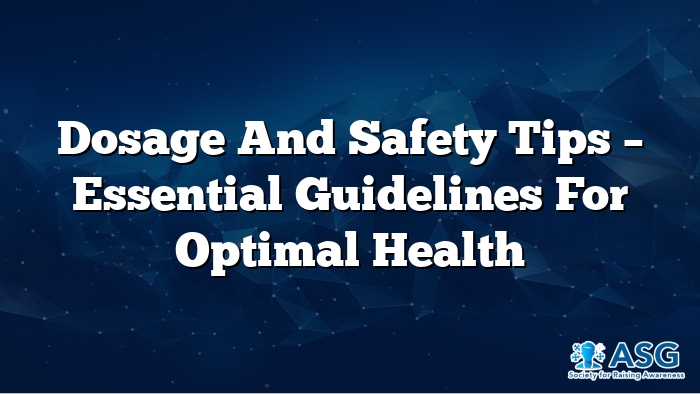Dosage and Safety Tips – Essential Guidelines for Optimal Health

Understanding the proper dosage of medications is crucial for both safety and effectiveness. Whether you're taking over-the-counter drugs or prescription medications, knowing the correct amount to take can prevent adverse effects and ensure optimal therapeutic outcomes. This comprehensive guide explores various aspects of medication dosage, from its importance to how lifestyle factors can influence it.
The Critical Importance of Proper Dosage
Proper dosage is the cornerstone of effective medication use. It ensures that the drug works as intended without causing harm. Taking the correct amount of medication is not just about following rules; it's about maximizing benefits while minimizing risks.
Underdosing can render a medication ineffective, potentially prolonging illness or leading to complications. On the flip side, overdosing can result in toxicity and severe side effects. This delicate balance underscores why adhering to prescribed dosages is vital for both efficacy and safety.
Common Dosage Mistakes to Avoid
Many people unknowingly make dosage mistakes that can impact their health. Some common errors include:
• Not following prescribed instructions
• Ignoring potential drug interactions
• Skipping doses or doubling up to compensate for missed ones
These mistakes can disrupt the medication's effectiveness and lead to complications. Always consult your healthcare provider if you're unsure about your dosage or have questions about your medication regimen.
Determining the Right Dosage for You
Finding the right dosage isn't a one-size-fits-all process. Factors such as age, weight, medical history, and overall health play crucial roles in determining the appropriate amount. Your healthcare provider considers these factors when prescribing medication.
For those using peptide products, it's essential to source them from reputable peptide suppliers. This ensures the quality and accuracy of the dosage. Always follow the dosage instructions provided by your healthcare provider or on the product label.
Safety Tips for Medication Use
Proper medication use goes beyond just taking the right dose. Here are some essential safety tips:
1. Always read the label and follow instructions carefully
2. Store medications in a safe place, away from children and pets
3. Use a medication organizer to track doses
4. Consult your healthcare provider or pharmacist with any questions
These simple step

s can significantly reduce the risk of medication errors and ensure safe usage.
Understanding Dosage Instructions
Dosage instructions can sometimes be confusing, especially when they include terms like “take with food” or “take on an empty stomach.” Understanding these instructions is crucial for the medication's effectiveness.
If you're unsure about any instructions, don't hesitate to ask your healthcare provider or pharmacist for clarification. This ensures you're taking the medication correctly and safely, maximizing its benefits.
Potential Side Effects of Incorrect Dosage
Taking the wrong dose of medication can lead to a range of side effects, from mild to severe. Common side effects of incorrect dosage include:
• Nausea
• Dizziness
• Headaches
• Fatigue
In severe cases, incorrect dosage can lead to organ damage or even be life-threatening. Always adhere to the prescribed dosage to avoid these risks and report any unusual symptoms to your healthcare provider immediately.
How to Adjust Dosage Safely
Never adjust your dosage without consulting your healthcare provider. They will consider various factors before making any changes, ensuring the adjustment is safe and effective.
If you experience side effects or feel your medication isn't working as expected, report this to your healthcare provider. They may adjust your dosage or switch you to a different medication based on your individual needs and response.
Dosage Guidelines for Different Age Groups
Dosage guidelines vary significantly across different age groups. Children and elderly individuals often require different dosages compared to adults due to differences in metabolism and body composition.
Always follow the age-specific dosage instructions provided by your healthcare provider. This ensures the medication is safe and effective for the intended age group, reducing the risk of adverse effects.
How to Store Medications Safely
Proper storage is crucial for maintaining medication effectiveness. Here are some key storage tips:
• Store medications in a cool, dry place
• Avoid exposing them to heat or moisture
• Keep medications in their original containers
• Always check the expiration date before use
For those using peptide products, proper peptide storage is essential to maintain their efficacy. Follow the specific storage instructions provided with your peptide products.
What to Do in Case of Overdose
If you suspect an overdose, seek immediate medical attention. Symptoms of overdose can include nausea, vomiting, difficulty breathing, and confusion. Do not wait for symptoms to appear before seeking help.
Keep emergency numbers handy, including poison control and your healthcare provider. Quick action can prevent serious complications and potentially save lives.
Interactions Between Medications
Medications can interact with each other, altering their effectiveness or increasing side effects. Always inform your healthcare provider about all the medications you're taking, including:
• Prescription drugs
• Over-the-counter medications
• Supplements
• Herbal remedies
Your healthcare provider can adjust your dosage or recommend alternatives to avoid potentially harmful interactions.
How to Read Prescription Labels
Reading prescription labels correctly is crucial for proper dosage. Labels include important information such as:
• Dosage amount
• Frequency of use
• Special instructions
• Potential side effects
Always read the label before taking any medication and consult your healthcare provider if you have any questions about the information provided.
Dosage Forms and Their Implications
Medications come in various dosage forms, each with its own implications for administration:
• Tablets
• Capsules
• Liquids
• Injectables
• Topical creams or ointments
Each form may require different handling and administration techniques. For example, liquid medications often require precise measurement, while peptide reconstitution may be necessary for certain injectable peptides.
Always follow the instructions for the specific dosage form to ensure the medication is effective and safe.
Consulting Healthcare Providers About Dosage
Regular consultations with your healthcare provider are essential for safe and effective medication use. They can provide personalized dosage recommendations based on your medical history and current health status.
Scheduled check-ups allow your healthcare provider to monitor your progress and make any necessary adjustments to your medication regimen. This ongoing communication is key to optimizing your treatment outcomes.
How Lifestyle Factors Affect Dosage
Lifestyle factors can significantly impact medication dosage and effectiveness. Some factors to consider include:
• Diet
• Exercise habits
• Alcohol consumption
• Smoking
• Sleep patterns
Always inform your healthcare provider about your lifestyle habits. They can provide recommendations to ensure your medication works effectively, which may include dietary changes or adjustments to your dosage.
The Role of Peptide Suppliers in Dosage Accuracy
For those using peptide products, the choice of peptide suppliers plays a crucial role in dosage accuracy. Reputable suppliers ensure:
• Accurate labeling
• Proper peptide purity
• Consistent quality
When sourcing peptides, look for suppliers who provide peptide certificates and conduct regular peptide purity tests. This ensures you're getting high-quality products with accurate dosage information.
Understanding Peptide Safety and Quality Control
Peptide safety is paramount when using these products. Reputable peptide manufacturers implement strict quality control measures, including:
• Peptide batch testing
• Peptide analysis
• Sterile manufacturing processes
These measures ensure the safety and efficacy of peptide products. Always purchase from trusted sources and verify the peptide authentication before use.
The Importance of Proper Peptide Storage
Proper peptide storage is crucial for maintaining potency and safety. Most peptides require:
• Refrigeration or freezing
• Protection from light
• Storage in sterile conditions
Understanding the peptide shelf life and following proper storage guidelines ensures the product remains effective throughout its intended use period.
Navigating Online Peptide Marketplaces
With the rise of online peptide stores, it's important to navigate these marketplaces carefully. Look for:
• Reputable peptide vendors
• Clear information on peptide legality
• Transparent peptide pricing
Be wary of excessive peptide deals or peptide sales that seem too good to be true. Quality should always be the priority when sourcing peptides.
Conclusion
Proper dosage is the cornerstone of safe and effective medication use. By understanding dosage instructions, avoiding common mistakes, and maintaining open communication with healthcare providers, patients can ensure optimal therapeutic outcomes. Whether dealing with prescription medications or specialized products like peptides, adherence to proper dosage guidelines is crucial. Remember, when in doubt, always consult with a healthcare professional to ensure you're using medications safely and effectively.
Frequently Asked Questions
How can I ensure I'm taking the correct peptide dosage?
Always follow the instructions provided by your healthcare provider or the reputable peptide supplier. Use precise measuring tools and consult a professional if you have any doubts.
Are peptide products legal to purchase online?
The legality of peptide products varies by region and intended use. Always check local regulations and only purchase from reputable suppliers who provide clear information on peptide legality.
How long can I store reconstituted peptides?
The storage duration for reconstituted peptides varies by product. Generally, they should be used within 30-60 days when stored properly in the refrigerator. Always check the specific storage instructions for your product.
